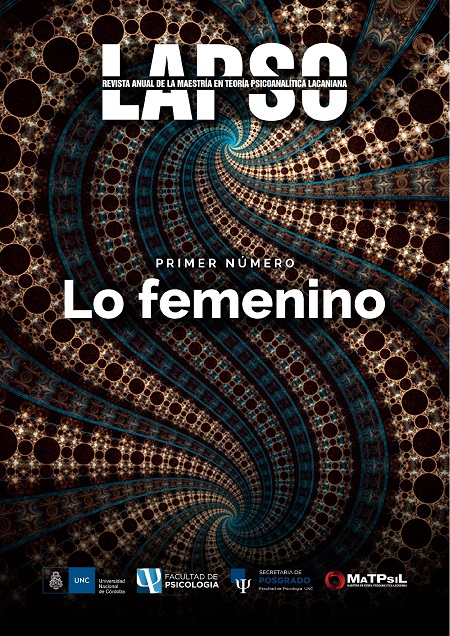El código enigma: La histeria y el discurso de la tecnociencia
Mots-clés :
Psicoanálisis, medios de comunicación, juego de imitación, feminidad, masculinidadRésumé
Este escrito se propone revisar el mutuo beneficio entre los medios de comunicación y el psicoanálisis. Expone que el psicoanálisis necesita cada vez más reconocer su eficacia como teoría de los medios de comunicación en su discusión sobre las formas contemporáneas del lazo social cuyos efectos se manifiestan en la clínica. También, plantea que tanto Turing como Lacan, en sus diferentes formas, establecieron que el pensamiento es un efecto de la simbolización que no necesariamente requiere un cerebro humano.Références
Biers, K. (2015). ‘The Typewriter’s Truth’ in Stephen Sale and Laura Salisbury (eds), Kittler Now: Current perspectives in
Kittler Studies. London: Polity, 2015, pp. 132-54.
Copeland, B. Jack (2004). (ed) The Essential Turing: Ideas that Gave Birth to the Computer Age. Oxford: Oxford University
Press.
Fink, B. (1995). The Lacanian Subject: Between Language and Jouissance. Princeton: Princeton University Press.
Freud, S. (1993). ‘The Rat Man or Notes Upon a Case of Obsessional Neurosis’ in Three Case Histories New York:
Macmillan.
Hodges, A. (2014). Alan Turing: The Enigma. London: Vintage.
Kittler, F. (1990). Discourse Networks 1800/1900. Stanford, CA: Stanford University Press.
Kittler, F. (1997). Literature, Media, Information Systems, edited and Introduced by John Johnston. London: G&B Arts.
Kojève, A. (1989). Introduction to the Reading of Hegel: Lectures on the Phenomenology of Spirit (ed) Allan Bloom.
Ithaca: Cornell University Press.
Lacan, J. (1953). ‘The Neurotic’s Individual Myth’ Text edited by Jacques-Alain Miller. The French text appeared in Issue
No. 17 of Ornicar? Periodical Bulletin of the Champ Freudien.
Lacan, J. (1988). The Seminar of Jacques Lacan: Book II: The Ego in Freud’s Theory and in the Technique of Psychoanalysis,
trans. John Forrester. Cambridge: Cambridge University Press.
Lacan, J. (1992). The Ethics of Psychoanalysis: Seminar VII, trans. Dennis Porter. London: Routledge.
Lacan, J. (1993). The Psychoses: The Seminar of Jacques Lacan Book III 1955-56, ed. Jacques Alain Miller, tr. Russell Grigg,
London: Routledge.
Lacan, J. (1999). Encore: Seminar XX, trans. Bruce Fink. New York: Norton.
Lacan, J. (2007). The Other Side of Psychoanalysis Seminar XVII, trans. Bruce Fink. New York: Norton.
Leavitt, D. (2007). The Man Who knew Too Much: Alan Turing and the Invention of the Computer. London: Phoenix.
Merriam, M. (2015). ‘The Unvarshished Tales of the Brother’s Grimm: A Conversation with Jack Zipes’ in World Literature
Today. July 29 2015. Worldliteraturetoday.org
Miller, D. (2005). ‘Obsession: A Name of the Superego’ The Symptom. Online Journal for Lacan.com
Soler, C. (2002). “Hysteria in Scientific Discourse” en Reading Seminar XX: Lacan´s Major Work on Love, Knowledge, and
Feminine Sexuality. NewYork: State University of New York Press.
Téléchargements
Publiée
Numéro
Rubrique
Licence
(c) Copyright Lapso 2018

Ce travail est disponible sous licence Creative Commons Attribution - Pas d’Utilisation Commerciale 4.0 International.
Se permite la generación de obras derivadas siempre que no se haga con fines comerciales. Tampoco se puede utilizar la obra original con fines comerciales.


